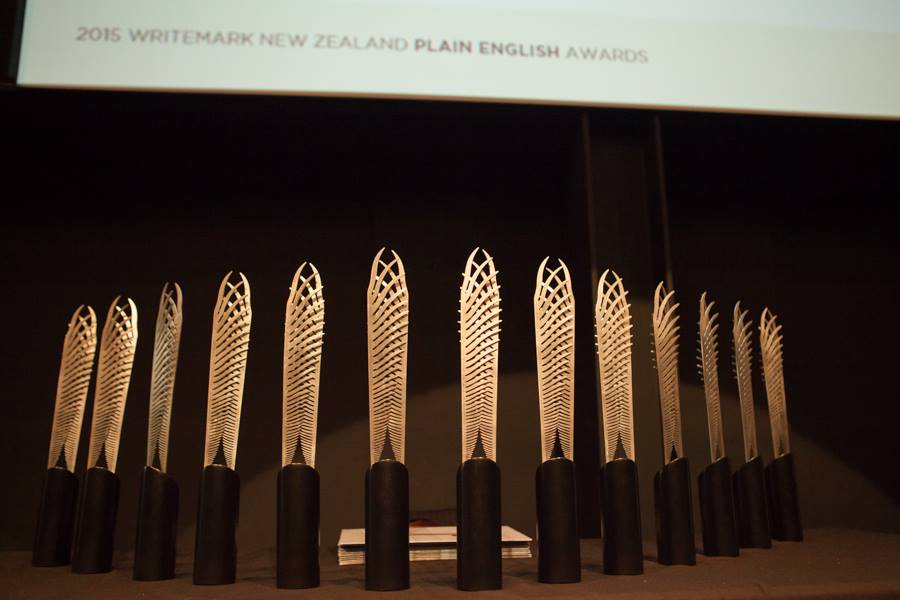
The fabulous Awards trophies created by sculptor Campbell Maud
We talk to Lynda Harris, plain language advocate and the original inspiration behind the Plain English Awards. Lynda is Chief Executive at Write Limited, premier Awards sponsor. The Awards are organised by the WriteMark Plain English Awards Trust and are now in their twelfth year.
All types of organisations enter — large and small, public and private sector. Basically any New Zealand organisation that cares about the way they communicate is a good candidate! Government organisations tend to get behind the Awards really well, but the corporate sector is increasingly well represented too.
Virtually any kind of business document or webpage can be entered. And, it’s not just documents — people and organisations are honoured too.
See the Awards categories here

The fabulous Awards trophies created by sculptor Campbell Maud
Actually, you’d be surprised! Many law firms, including top tier firms and smaller niche firms, are proactively marketing themselves with plain English as part of their brand. The Awards include a dedicated category for legal documents, so watch this space!
Many financial organisations — banks and insurance companies especially — enter the Awards with impressively clear documents. In fact, a major bank (ANZ) and several other financial organisations have done especially well in the general categories over the years. We also have a special category for annual reports.
Twelve of the thirteen awards honour positive effort and results. The thirteenth ‘trophy’ (really a stainless steel bin filled with sour lollies) goes to the winner of the dreaded ‘Brainstrain’ award. That award goes to the worst document or website nominated by a member of the public. For the unlucky organisation receiving that award, confusion wins!
The Brainstrain award has a very positive side though. Very often, being nominated for a Brainstrain award is a wake-up call for its owner. Many use the nomination as an opportunity to look hard at their communication style and make really positive changes.
The Brainstrain award, along with its counterpart ‘Best Communication’ award, is sponsored very appropriately by public watchdog Consumer NZ. Thanks to Consumer NZ’s support, you can dob in a bad document, or praise an easy-to-read one.
Read about the special People’s Choice categories here
The Awards are offered by the WriteMark Plain English Awards Trust, ably led by chair and well-known people’s advocate Gregory Fortuin. Premier sponsor Write Limited does the administration on behalf of the Trust.
Other valued sponsors provide much appreciated financial and in-kind support.
Absolutely! The process leading to success in the Awards transforms some organisations and individuals into zealous advocates for plain English. We’re due to do another feedback survey early next year, but previous surveys have given us overwhelmingly positive comments from entrants and others. Here are a few of those comments:
The Awards are the premier benchmark for high standards and achievement in plain English. Success in the Awards shows we’re not only doing it [plain English], but doing it well and our expertise is being recognised.
Winning the award has raised the bar.
We were shocked by being a finalist for the Brainstrain Award. That spurred a huge project. I personally did lots of research on plain English and came up with our own web writing standards that exceed the e-government guidelines.
The Awards also act as a public watchdog, highlighting examples of poor writing that are barriers to good communication and people achieving what they want to do.
Who’s the clearest of them all?